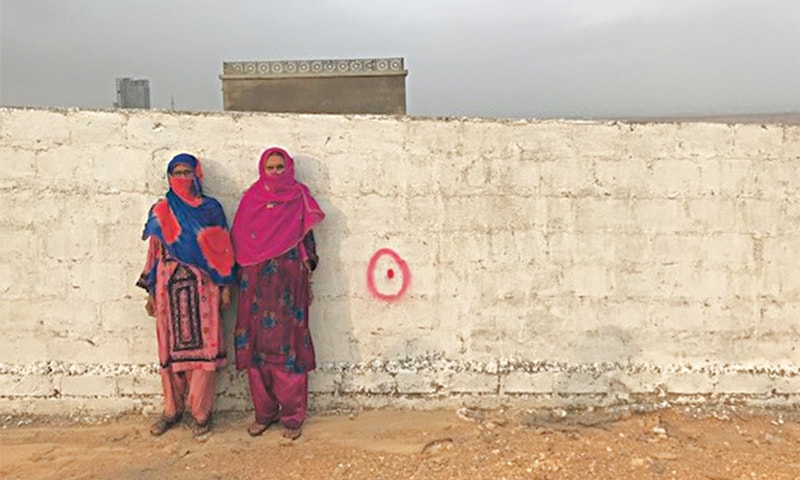KARACHI: In the wake of the Supreme Court’s March 21 order pertaining to Bahria Town Karachi (BTK), the residents of the villages in Malir that fall within the massive housing project say they are fighting an uphill battle to save their homes.
Not far from where three huge granite columns — each one topped with a statue of a black horseman — mark the entrance to the upcoming ‘Bahria Paradise’ section, is Haji Ali Mohammed Goth. For the residents of this village, life has become a living hell. They say they are under constant threat of being evicted from an area that has been home to generations of their families.
According to them every few days the police, led by SHO Gadap, and accompanied by Bahria personnel arrive to intimidate them into abandoning their homes. The villagers respond by pelting stones and shouting at them to leave them alone.
‘This is our zameen’, say villagers
Among them are Hawwa and Hajrah Bibi, who are determined not to give in. “They claim they have paid the government for this land,” says Hawwa Bibi indignantly. “This is our zameen.” The women were speaking recently to a group of civil society activists and journalists visiting several goths in the area. Hawwa and Hajrah’s fury was palpable; it spilled out in their raised voices, their rushed sentences, and above all, in their eagerness to share their experiences with a hitherto largely unresponsive public.
The order of the Supreme Court’s implementation bench, announced on March 21, permitted Bahria to develop 16,896 acres that it said were already under development by the real estate giant. The bench had been set up on the orders of a three-judge SC bench that, in a searing verdict, had declared Bahria’s acquisition of land for its housing scheme illegal and “void ab initio”.
A few days ago, a posse of policemen descended on the little village along with Bahria officials — one of whom, the women said, remained nearby sitting in a black 4x4 with tinted glasses watching the proceedings. This time the Bahria personnel marked several houses with a bull’s eye in red paint, and told the owners their homes would be demolished after Eid.
One of them is a two-room house that Hawwa Bibi has had incrementally built over six years. It is meant to be a home for one of her four sons who is to be married shortly after Eid. “I used my savings to buy cement, bricks and so on, and hired labour from Gadap to construct it,” she says. “It cost me six or seven lakh rupees.” The house is in the centre of a reasonably large courtyard, to allow for an expanding family to add to the original structure.
Hajrah Bibi has a similar story. She too is getting a small house constructed for her soon to be married son. This one took four years and cost Rs300,000 to build.
The financial hardships for the village have steadily increased since the real estate developer arrived in the area. “We had 80 to 90 heads of livestock before,” says Hajrah Bibi. “Now we’re reduced to 15.”
Aside from a shrinking pastureland, their communal farmland has disappeared before their eyes, depriving them of their main sources of income. “My sons used to be employed by Bahria as security guards, but they’ve been laid off,” relates Hawwa Bibi. “Now they [Bahria] tell us to give up our village in return for giving back their jobs.”
According to the two matriarchs, most of the men in their families have been forced to look for menial jobs in Gadap and elsewhere. Nevertheless, even if their old way of life may be gone forever, they maintain they are determined to fight for their homes — in the midst of the thousands of upmarket residential properties coming up around them.
Published in Dawn, August 7th, 2019

















































